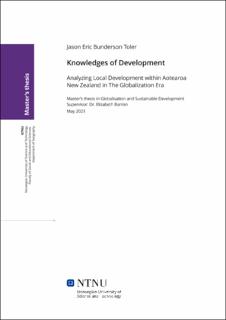| dc.description.abstract | Knowing is the first step in the act of becoming. Local communities around the world have developed forms of active knowledge embedded in local landscapes and ways of being. In Aotearoa New Zealand, local development organizations use these knowledges as tools to create change. The thesis presents a research project which investigates these knowledges of development and identifies 42 operational tools and 34 field tools using Thomas Hyllan Eriksen's classification of knowledge and the Community Economies Framework of J. K. Gibson-Graham.
The project centers on the case of Understorey, one of several projects to emerge from the rubble of post-quake Christchurch. This time of change in Christchurch has been complicated by crises of globalization, including climate change and a global pandemic. The tools and knowledge Understorey uses to practice development in Christchurch are informed by the local concept of 'mauri ora' studied by the Huritanga research team. In partnership with this team, the project uses joint interviews to situate local knowledges within the knowledge landscapes of Aotearoa New Zealand.
All of these knowledges simultaneously exist within a larger discourse created through processes of globalization. These expert knowledges are wielded by powerful officials in expert knowledge systems to set development agenda at the national and international level. The project identifies three officials — Gerry Brownlee, Bob Parker, and Mark Solomon — working to reembed development knowledge into the local experience through the knowledge production cycle.
The thesis traces this cycle by sharing the stories of some of the knowledges identified in the research project. As these knowledges travel between local and expert knowledge systems through the work of local and expert development actors, the city of Christchurch becomes transformed and new knowledges are produced. By sharing these stories and presenting them with respect to local rangatiratanga, the thesis discovers the tools that community organizations use to meet local goals and uncovers their relations to those drawn by officials in expert knowledge systems. It presents knowledge as discourse, as research guide, and as a tool. In the end, the thesis finds that creating knowledge and proactively adapting to change creates development. | |
